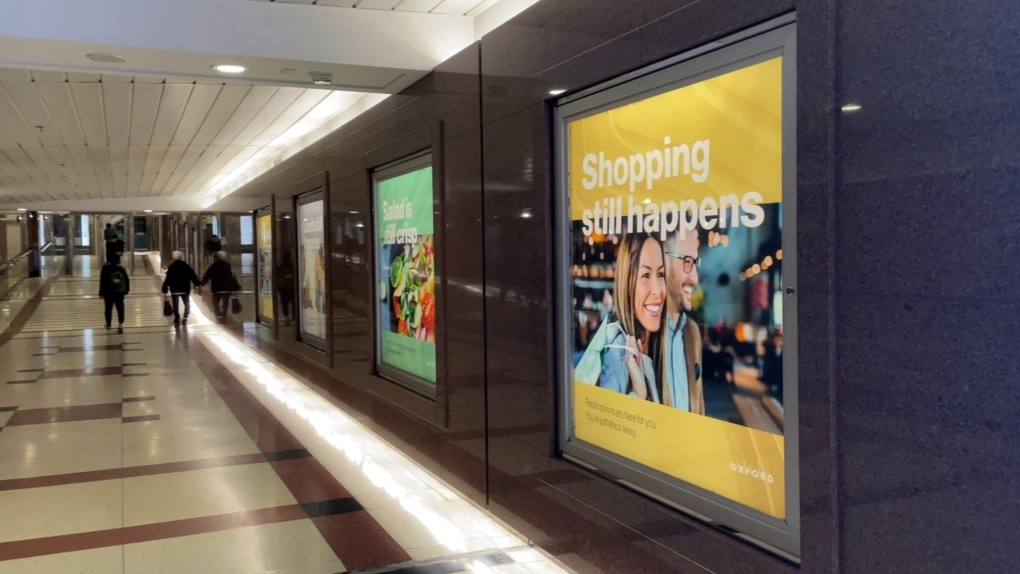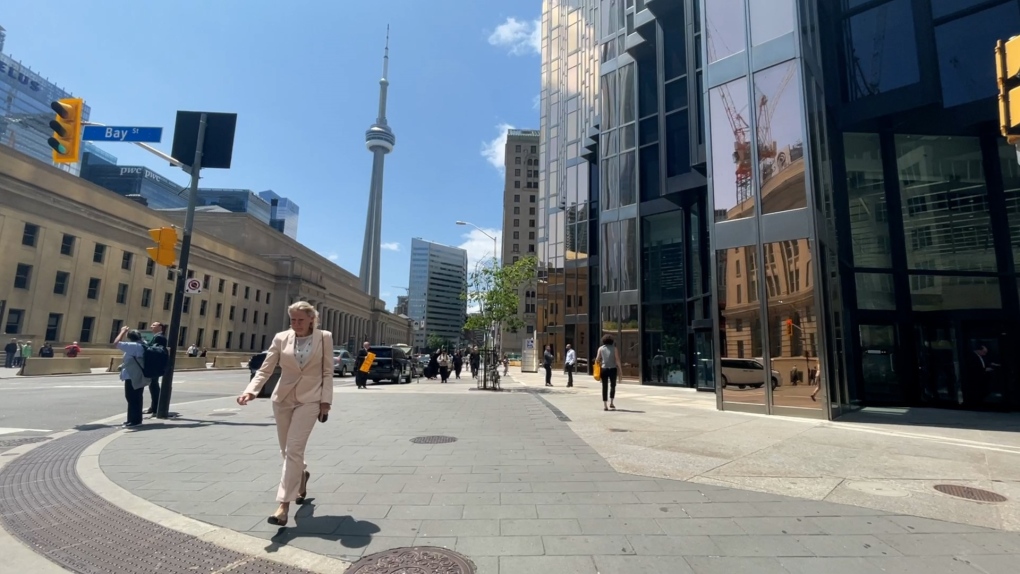'Economic reason to be concerned': Toronto's downtown recovery still stalled compared to other cities
In Part 2 of its Downtown Decay series, CTV News Toronto examines the state of the core post-pandemic—and how it has fared in its attempt to bounce back.
In his once-bustling shoe repair shop, Kiarash Akbarpour is on the brink of shutting down. The financial district foot traffic that once strolled past his storefront has dried up, and more than half of his previous customers now work from home.
“We can’t make any money,” Akbarpour told CTV News Toronto. “We can’t cover my costs.”
His shop is situated in Toronto’s PATH, the underground network that connects the core’s office towers. Pre-pandemic, the tunnels were flooded with workers grabbing a morning coffee, dropping off dry-cleaning, or squeezing in a haircut; now, it’s a ghost town.
“It really isn’t the same, said Mehul Chaudhary, who works downtown. “Monday to Friday are pretty much 30 per cent of what it used to be.”
 Inside downtown Toronto's PATH network. (CTV News Toronto)
Inside downtown Toronto's PATH network. (CTV News Toronto)
An Oxford ad campaign boasts “shopping still happens,” but fewer than half of workers are back to their downtown desks.
“Getting back to the office in the downtown core has been extremely slow, we’re one of the slowest cities in North America,” incoming Toronto Region Board of Trade president Giles Gherson told CTV News Toronto. “And that’s worrying.”
In fact, Toronto’s downtown recovery nears the bottom of the pack when compared to most North American urban centres, according to research by University of Toronto School of Cities director Karen Chapple.
Chapple used cell phone data to assess how 63 downtown centres bounced back from COVID-19 closures and lockdowns. New York City rebounded to 75 per cent of its pre-pandemic activity level, while Toronto’s activity level trailed at 47 per cent.
Overall, Toronto’s recovery ranked 55th — a worrisome slump.
 Nearby Union Station in downtown Toronto. (CTV News Toronto)
Nearby Union Station in downtown Toronto. (CTV News Toronto)
“There is a problem with that, particularly because actually the numbers are going down right now, and not up,” Chapple told CTV News Toronto.
“What we’re seeing now is businesses are giving up their commercial office leases.”
The vacancy rate for those downtown towers is now upwards of 15 per cent, with some experts predicting that figure will climb as leaseholds come due for renewal and more employers opt to reduce their physical footprints.
“We built a lot of office buildings in Toronto, this is one of our problems,” said Frank Clayton, co-founder of Toronto Metropolitan University’s Centre for Urban Research and Land Development.
“We kind of oversupplied the market, vacancy rates got down to one per cent … then of course the pandemic hit.”
Construction in the core and scaled-back transit deter workers from wanting to return to their offices, which in turn leads to fewer patrons to support nearby retail and restaurants.
 A nearly empty patio in downtown Toronto. (CTV News Toronto)
A nearly empty patio in downtown Toronto. (CTV News Toronto)
“People are less likely to go downtown for restaurants because they’re not open as much. And they’re not open as much because the people who used to eat lunch there are not downtown,” said William Strange, who teaches urban economics at the University of Toronto.
“Once we start not going downtown then it’s one of these ballroom dancing things, where it’s a question of who gets the courage to go on the dance floor first? And since it’s so closely linked to Canada’s productivity, there really is good economic reason to be concerned about that.”
Ankush Deshpande jokes that he is part of the problem, since he’s only back to his downtown office two days a week.
“Pre-pandemic, definitely this was a bustling city,” he said. “Hopefully things will improve, and people will come back to work again.”
In Part 3 of Downtown Decay, CTV News Toronto will examine the path forward for Toronto’s core—and how the city can reverse the downturn downtown.
CTVNews.ca Top Stories

U.S. president-elect's son shares post on X of Donald Trump buying Canada on Amazon
U.S. president-elect Donald Trump and those in his corner continue to send out strong messages about Canada.
Economists say more room to fall as Canadian dollar continues downward trend
Experts say the next few months are going to be rough for the Canadian dollar as it appears set to continue its downward trend.
Quebec fugitive killed in Mexican resort town, RCMP say
RCMP are confirming that a fugitive, Mathieu Belanger, wanted by Quebec provincial police has died in Mexico, in what local media are calling a murder.
5 rescued after avalanche triggered north of Whistler, B.C. RCMP say
Emergency crews and heli-skiing staff helped rescue five people who were caught up in a backcountry avalanche north of Whistler, B.C., on Monday morning.
Trudeau could stay or go. Either way, Canadians should brace for a spring election
Canada appears to be barrelling toward a spring election now that the NDP is vowing to vote down the government early next year -- whether Prime Minister Justin Trudeau stays on or not.
Revised airline compensation rules will do little to change status quo: experts
Proposed changes to Canada's passenger rights charter will perpetuate loopholes that allow airlines to forego compensating travellers whose flights are disrupted, say airline experts.
American imprisoned in Russia sentenced to new 15-year jail term for espionage
A Russian-born U.S. citizen already imprisoned in Russia on a bribery conviction has been handed a second 15-year jail term for espionage, Russian news agencies reported Tuesday.
Parties agree on the need to act on online harms, but time is running out for new law
Justice Minister Arif Virani is unapologetic about the money it would take to set up new regulators to tackle online harms under his proposed legislation.
A blast at a Turkish armaments factory kills at least 12 people
An explosion at an armaments factory in northwest Turkiye left at least 12 dead and four injured Tuesday morning.

































